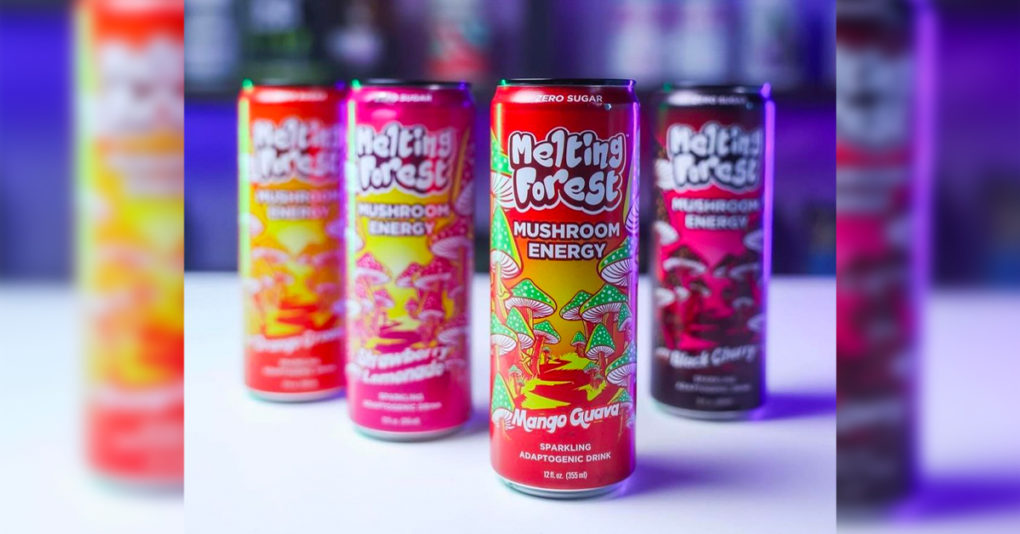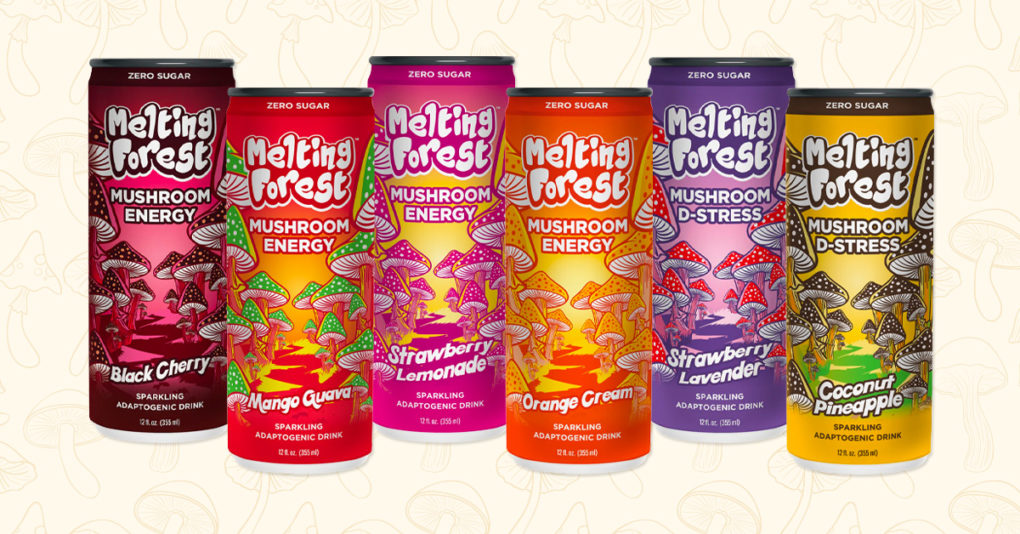In the growing market for stress-relief beverages, a new functional mushroom platform brand is hoping to melt consumers’ woes away.
Melting Forest is a brand of adaptogenic mushroom (Lion’s Mane and cordyceps) beverages created by California-based CBD Living, which also produces a large array of CBD and Delta-9 THC infused drinks, edibles, supplements and more. The products arrive as the market for functional mushroom drinks has risen steadily for several years, via premium drink mix brands like Four Sigmatic and MUD\WTR.
However, Melting Forest is now one of several brands playing in the ready-to-drink beverage space putting functional mushrooms – along with clean energy and relaxation positioning – at the forefront.
Just last week, mushroom elixir maker Odyssey closed a $6 million funding round as it has put its focus behind its energy drink offerings. Other startups such as Space Tea and Immorel have touted functional mushrooms as their hero ingredient, while functional non-alc cocktail alternatives such as De Soi have also tapped into functional fungi as a means of providing a sober buzz.
As consumers report feeling higher degrees of stress, Melting Forest chief revenue officer David Martin suggested that the brand will aim to meet the need for clean and level energy, as well as relaxation.
“Now you’ve got the millennials and the Gen Zers, yes they’ve got some buying power, but just think about the absolute stress that they’ve got from an economic standpoint, just going out on their own,” Martin said.
Finding a Path
Melting Forest offers an array of canned 12 oz. beverages in both energy and relaxation varieties, as well as gummies. The energy drinks contain 150 mg of caffeine from green coffee beans, organic Lion’s Mane and cordyceps mushrooms and L-Theanine and come in Black Cherry, Mango Guava, Orange Cream and Strawberry Lemonade flavors. Its relaxation D-Stress beverage line is made with organic Lion’s Mane and reishi mushrooms, L-Theanine, rhodiola and magnesium citrate and comes in Strawberry Lavender and Coconut Pineapple flavors.
Each 12 oz. can retails for $3.99, or online for $47.88 per 12-pack.
In addition to beverages, the brand also offers a gummy supplements line, which retails for $39.99 per 30-count bottle and comes in D-Stress (Dragonfruit), Sleep (Prickly Pear) and Daily (Mixed Berry) varieties.
Since launching last month, Melting Forest is now available in around 650 retail accounts primarily in California, including roughly 500 smoke shops, as well as chains like Bristol Farms and around 60 7-Eleven locations. Outside of California, the brand’s drinks and supplements are also now in King Soopers accounts in Colorado and Better Health in the metro Detroit area.
According to the company, the brand has also partnered with distributors UNFI, KeHE, C&S Wholesale, POD Foods and HRR Foods, as well as limited DSD distribution via Tenace Incubation in Southern California.
Martin said the company will mainly focus on growing along the West Coast and in Hawaii for 2024, but opted to add King Soopers after the Kroger banner approached the brand for placement in its natural set. Next year, Martin said the company intends to expand across the Midwest and will eventually aim to seed the East Coast by 2026.
For CBD Living, Melting Forest not only fits the brand’s M.O. of developing relaxation and wellness products, but also provides an alternative to its hemp-based core line where there’s no regulatory uncertainty around the ingredients, said CEO Sean McDonald.
Although the company has found that consumers understanding of CBD is continuing to rise, and CBD Living’s sales “remain strong” – particularly in alternative channel accounts like independent liquor stores, smoke shops and chiropractic offices – McDonald suggested the lack of legal clarity around the sale of hemp food and beverage products as “put a damper” on the industry. Functional mushrooms, however, provide the company with a clear cut path to mainstream retail.
A report from Grand View Research found that the U.S. market size for functional mushrooms was valued at around $3.6 billion in 2022, and is now projected to grow at a 12.1% CAGR between 2024 and 2030.
McDonald said the Melting Forest branding is intended to be inviting and communicate that sense of relaxing, and said the company aimed to create a “nostalgic” sensibility with the vibrant colors and cartoonish mushroom imagery, while avoiding what he called “bland” designs frequently used by other brands in the functional beverage space.
“We wanted to blend in some color with it, and not really go psychedelic, but be on that edge,” he said. “So you’re like ‘Hey, what is this?’ I’m seeing this in my natural grocery store, so it must be a better-for-you product to be here.”
Looking ahead, McDonald said he hopes that the brand will eventually resonate with consumers of all ages, suggesting that the “young educate the old” and more Gen Xers and baby boomers are also becoming aware of the benefits of plant-based products and functional mushrooms.
“We’ll keep pushing on the millennials and groups like that are going to be the ones to purchase our product, but we’re also finding the older generations are trying to become hip with it too and are learning about all these adaptogenic nootropics and things that are better for them than relaxation with alcohol, for instance,” he said. “So the trend is happening across the board.”

